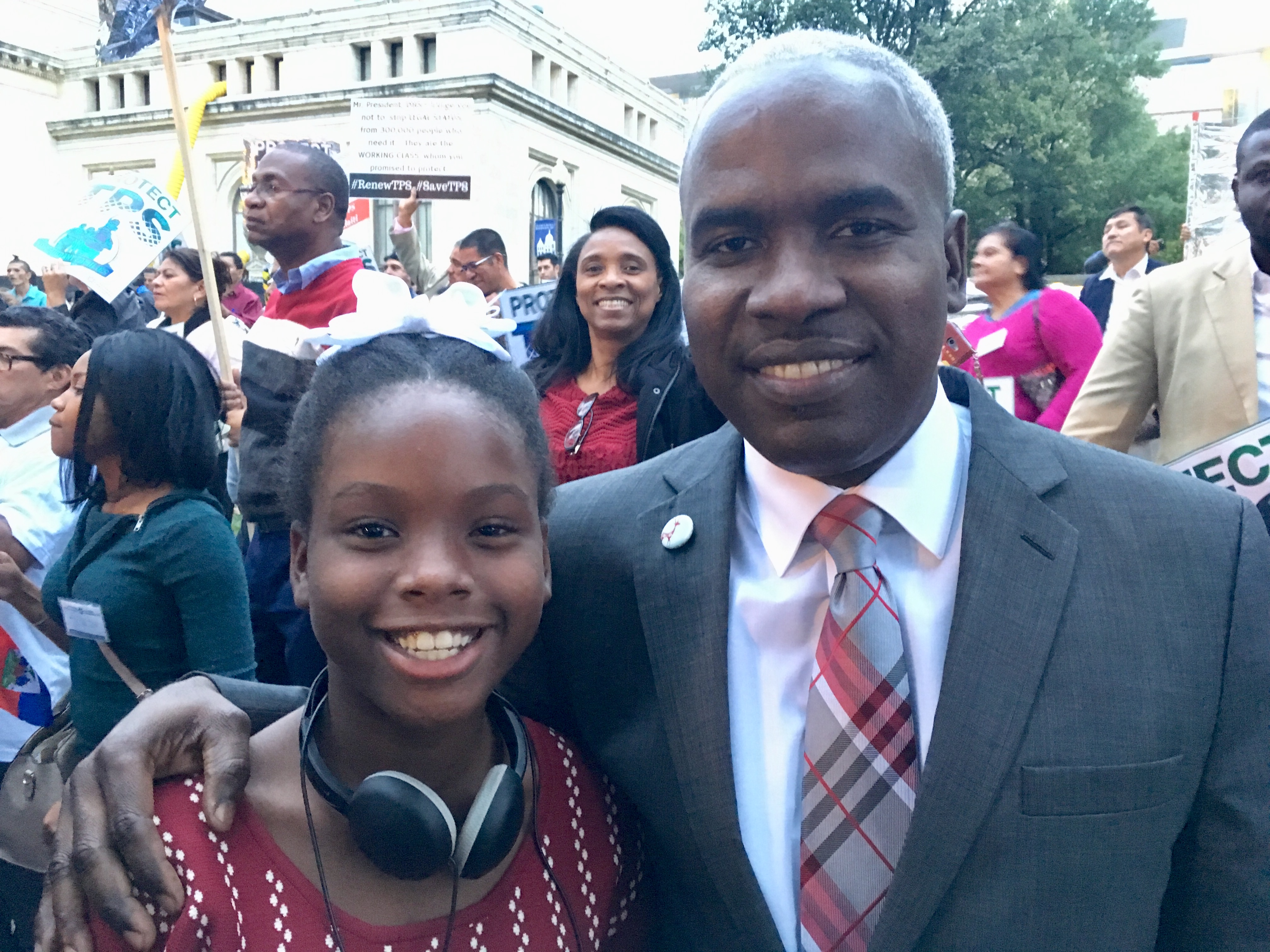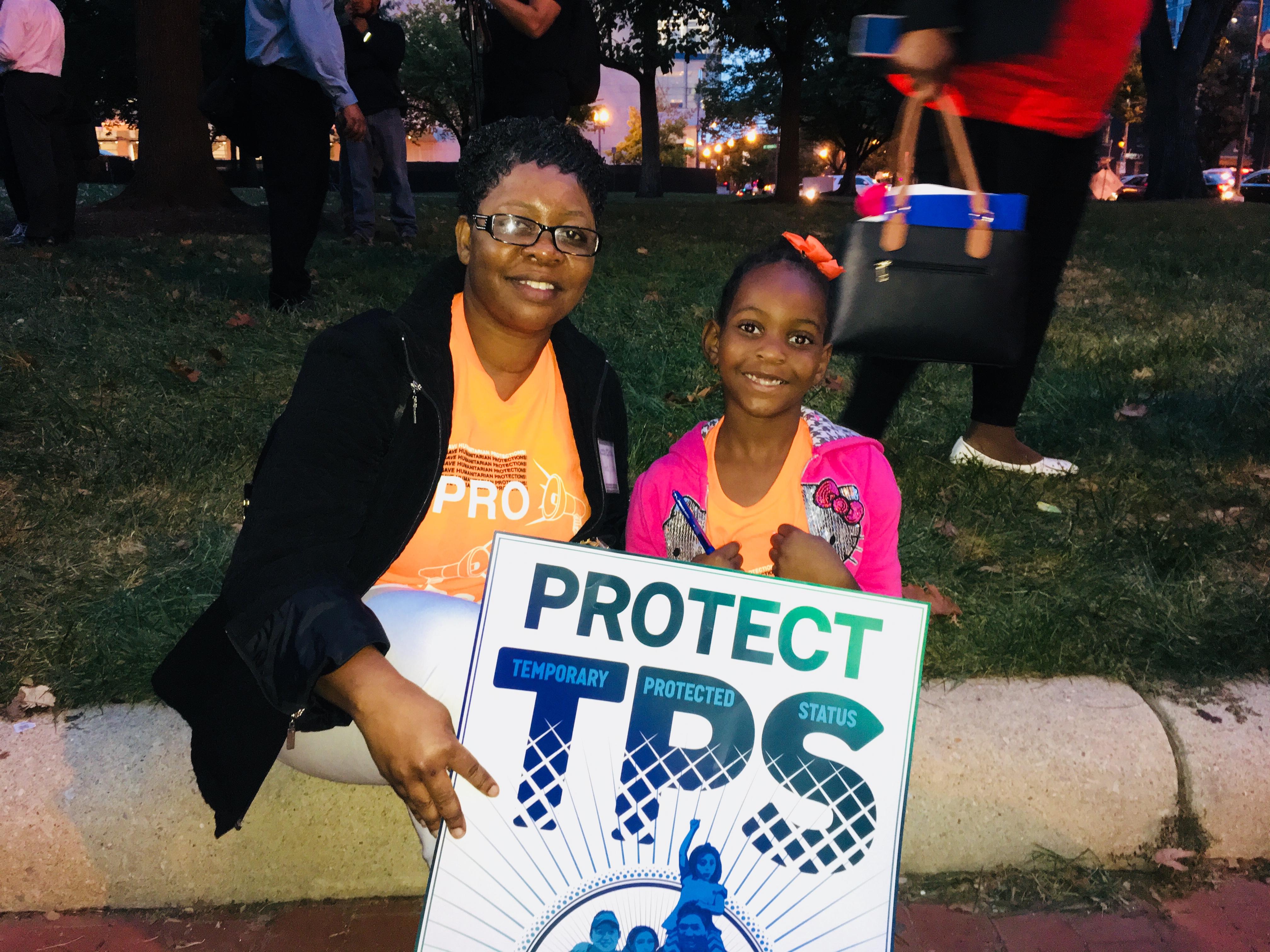WASHINGTON, D.C. — At least 100 immigrant activists held a rally outside a Department of Homeland Security (DHS) office in downtown Washington, D.C. Monday night, with one goal in mind: to call on President Donald Trump to extend Temporary Protected Status, a type of temporary legal status provided for people fleeing extreme situations back in their home countries.
Out of the total 320,000 TPS recipients in the United States, roughly 300,000 in the United States are originally from El Salvador, Honduras, and Haiti. Many are already fully integrated into United States and have family ties here. More than half of El Salvadoran and Honduran TPS beneficiaries as well as 16 percent of Haitian TPS beneficiaries have lived in the United States for 20 years, according to a Center for Migration Studies report. At least 51,700 work in the construction industry, while many others work in the restaurant and food services industry, landscaping services, child day care services, and at grocery stores.
TPS renewal dates vary by country, with the expiration approaching for Nicaragua and Honduras on January 5, 2018. The DHS agency is expected to announce a decision on these expiration deadlines on November 6, 2017. The agency is also expected to announce a decision for Haiti’s TPS expiration status near Thanksgiving.
The Trump administration permanently terminated TPS status for Sudan in November 2018. Meanwhile, the administration extended TPS for South Sudan through May 2019. Now that the administration has a few days left to decide whether to allow other protections to expire, TPS holders are facing a difficult decision on what to do with their future.
At the rally, Claudia Rojas, a 23-year-old TPS holder originally from El Salvador, chanted alongside other organizers shouting in various languages, “What do we want? TPS! When do we want it now?” and “From TPS to PPS [permanent protected status], we belong in the U.S.”
Patting down the front of her “Protect TPS for migrant families” banner against a strong wind that had picked up, she told ThinkProgress that she and her mother became TPS holders after they entered the country in 2001.
“I am fighting for my right to be here.”
“I don’t have much family other than my mom and my U.S. citizen brother who are here,” Rojas responded, when asked what life would be like if she is faced with a decision to go back to El Salvador. “I am fighting for my right to be here.”
Rojas said she had dreams of starting a career as a writer or editor but with a TPS deadline of March 2018 looming in the distant future, she is afraid that no employers would want to give her a chance. Having just graduated with a bachelor’s degree in English at George Mason University in Virginia, Rojas now hopes that the president will extend her TPS for another 18 months.
“I’m in a very difficult position,” Rojas said. “A lot of things are even more in limbo than before. I’ve been here for 16 years and throughout those 16 years, we’ve gone through background checks, paid fees. We paid our taxes so we’re not living off any program.”
Rojas is just one of the estimated 21,500 Salvadoran TPS holders in the state of Virginia, according to a fact sheet recently produced by the think tank Center for American Progress. (Editor’s note: ThinkProgress is an editorially-independent news site housed within CAP.) Another 2,000 Hondurans in the state are TPS holders. According to CAP calculations, Virginia would lose $1.2 billion from state GDP without Salvadoran TPS workers like Rojas’ mother.

One of the people leading the chanting was ten-year-old Ronyde Christina Panthieux, a U.S. citizen who took the megaphone to give a rousing speech in front of after-work onlookers to plead with the administration to extend TPS for Haiti so that her parents can stay.
“Because of [TPS] many great things would not have happened, including I would not be born now,” Ronyde Christina said, pointing out. “We would have to go with them [back to Haiti] or stay with someone else.”
“We need family reunion, not family separation.”
Posing a powerful question, she asked Trump to imagine what it would be like for his 11-year-old son Barron if his parents were deported.
“President Trump should understand this. He has a son,” Ronyde Christina said. “What if he was in our position? How would he feel if he was in our position? How would he feel if his son was taken away from him? We need family reunion, not family separation.”
Ronyde Christina’s father Rony Sylvain, who stood nearby and swayed along with some of the chants, is currently a registered nurse working in Miami, a town where he set down roots with his family.
“America needs professionals like myself — I was educated in the U.S.,” Rony Sylvain told ThinkProgress. “The United States invested in me and I’m taking care of patients. I’m contributing, paying taxes, I have a home and paying taxes. If you deport those hardworking people, you’ll lose those taxes. It’s billions of dollars. If you need to make America great again, without money, there’s no America. We’re part of the people that makes America great.”
As the elder Panthieux alluded to, there are currently 44,800 Florida residents who are TPS holders from El Salvador, Honduras, and Haiti. According to the CAP fact sheet on Florida, the state stands to lose $1.2 billion if it loses its Haitian TPS workers, many of whom work in accommodation and food services, retail, and health care and social assistance. The same report found that Haitians TPS holders in Florida have lived in the United States for an average of 12 years.

Florida resident and TPS holder Yolnick Jeune was similarly concerned about the prospect of her future. But as a mother with teenage children as well as a seven-year-old daughter who came to the rally with her, Jeune was additionally frustrated that the life she had created for her family over the past decade could be taken away.
Holding up a sign reading “Protect TPS” with her daughter Lagranda Jeune, Yolnick pointed out that her hard work has helped her family thrive in the state of Florida. Among her various professions: hair stylist, cashier, school district employee for six years, certified nursing assistant, behavioral assistant, and financial adviser. “I have a 2-14 license,” she proudly stated, referring to the Florida life insurance license code for agents.
“I’m not here to be a delinquent, to be a problem to this country.”
“I’m not here to be a delinquent, to be a problem to this country,” Yolnick said, explaining that after she arrived in the United States, she learned English so that she would assimilate as quickly as possible. “I’m here to work and contribute to this economy.”
Yolnick’s children have not taken well to the news that she may be sent to Haiti, a country unequipped to handle an influx of TPS returnees. One year after Hurricane Matthew — a Category 4 hurricane that killed 546 people, internally displaced 175,500 people, and wiped out 22 percent of the country’s GDP — Haiti remains vulnerable, with people still requiring humanitarian assistance. Her older children are now ready to attend college, but feel “miserable” about what could happen if the Trump administration decides to terminate TPS for Haitian immigrants.
“My children are miserable,” Yolnick said. “My daughter almost tried to kill herself because she doesn’t know what to do. She doesn’t want to go back to Haiti. She wasn’t born in Haiti. She doesn’t speak Creole.”
“After the earthquake [in 2010], people there have lived an empty life.”
“We are in deep pain, but we are prepared for the good and the bad,” Yolnick said. “After the earthquake [in 2010], people there have lived an empty life. Going back to Haiti right now would be a crime to me. This is how I see it. Going back there, you don’t have any resources.”
Yolnick’s daughter Lagranda — a polite and spirited second grader with immaculate penmanship for a child so young — attended the rally because she wanted to let people know the administration’s biggest decisions could affect the smallest U.S. residents. Wearing a red hair bow and Hello Kitty jacket, Lagranda had a serious message to send the president: life would be “terrible” for her family if her mother Yolnick, was sent back to Haiti, a country she hasn’t seen since 2004 when Tropical Storm Jeanne hit. As such, Lagranda would like to request the president to let her mother stay in the country so they can be together “forever.”
“It would be bad if one person had a child and was deported from their child,” Lagranda said with a dramatic flourish. “It would be terrible!… I would suffer without a mother or a father or if anybody in my family were deported. It would be very sad. I need to stay where my family is, where I belong, right here in America.”
To make her point, she repeatedly asked to see this reporter’s notepad. On a clean page, Lagranda made a seat out of the sidewalk curb and began writing a message for the president: “This brouht [sic] by me Lagranda I want to stay wear [sic] I need to Be forever.”
She then bounced away with her mother who began walking towards activists at the end of the rally leaving the intersection of 8th St and K St NW.
